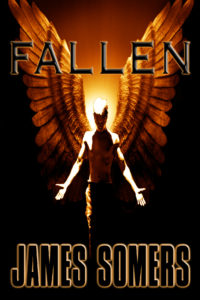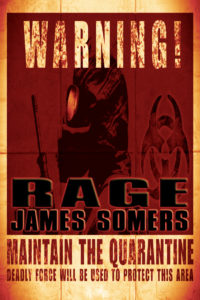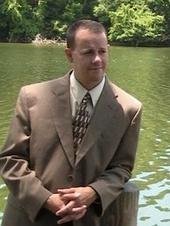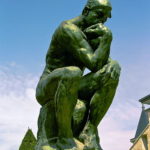How Then Can It Be Christian?
 I recently received a very negative review from a woman claiming to be a Christian reader of speculative fiction. Bad reviews are never enjoyable, but the reason for this one struck me strangely because she didn’t seem to understand the point of the story and was confused that my plot could even be a Christian plot line at all. The review was for my Descendants Saga novel: Fallen.
I recently received a very negative review from a woman claiming to be a Christian reader of speculative fiction. Bad reviews are never enjoyable, but the reason for this one struck me strangely because she didn’t seem to understand the point of the story and was confused that my plot could even be a Christian plot line at all. The review was for my Descendants Saga novel: Fallen.
This book is a Harry Potter type of book that attempts to blur the lines of good and evil. It is filled with magic, spells and every filthy occult practice. As such, it does not bring glory to God, but serves only to confuse.
Perception is everything. Many reviewers have rightly said this is a dark story. How then can it be Christian?”
–Amazon Reviewer
I responded to this person with an explanation that focused upon the Word of God and what we find written there. The Bible gives a very comprehensive look at human history and the way God has dealt with mankind in various situations. It explores the history of the Jewish people in great detail in the Old Testament and never fails to give us both the good and the bad found in man by his nature. We are even given a great deal of understanding about the evil powers that are set against mankind and their rebellion to God and his purposes. None of it is sugar coated in the Scriptures.
I’m reminded of the fall of man in the garden, the terrible judgment of God upon mankind during the flood that killed at least thousands, if not millions, of people who did not serve God. We find idolatry, sorcery, homosexuality, bestiality, murder, and rebellion to God throughout the pages of scripture. Does that make the Bible full of darkness? Of course not. What it means is that God’s Word gives us a realistic view of evil as well as good. That’s what truth is. It’s not sugar coated for the masses, it lays bare all that we are and teaches us about what we could be.
This is where I think an exciting, morally right story becomes useful. As the authors of Christian speculative fiction, we have the opportunity to cast light on subjects. We don’t have to glorify evil in order to cast light on the subject, but neither should we shy away from making a villain a villain. An editor once told me that she was looking at one of my manuscripts and had to put it down for awhile because she was startled by the ruthless nature of my primary antagonist. She said, Your villain really is evil.
I’m not sure if it was meant to be a compliment or not, but it certainly got me thinking. Is there any reason why the bad guys in our stories shouldn’t be bad guys? Isn’t that the point? In fact, I believe that there should be a pretty fair gap between what we call good and what we call evil in a story. I’m not saying that our protagonists should be virtuous supermen who never tell a lie or have a bad day. After all, a good man or woman in the Bible was hardly perfect.
Consider David who was a man chosen by God to be the king of Israel. He was called a man after God’s own heart, but he wasn’t perfect–not even close. He slept with another man’s wife and fathered a child by her. He devised a plan to trick the man into thinking it was his own child. When that didn’t work, he had the man killed in battle. That’s pretty ruthless, eh? David was far from perfect, and God judged him for it. The child even died as a direct result. Not exactly sunshine and roses, but we do see truth. Man’s wickedness and God’s justice and judgment revealed, followed ultimately by his forgiveness.
The Bible is full of such examples, and they never get sugar coated. As a matter of fact, I refrain from mentioning some of the details of many more gruesome stories in scripture because some of you might blush and the article might not get printed. But a solid understanding of evil and corruption in the human heart also shows us why our Savior’s sacrifice was so necessary, why we need to understand our own guilt and seek God’s forgiveness.
Good Christian novels can do this. As authors we can show people why we need a savior in our plots of corruption and greed and dark things. We don’t have to glorify evil as so many do, but we shouldn’t gloss over the reality that it does exist. And we can show it for what it is without being lewd and crude and foul-mouthed about it either. There is no place for gratuitous sex or vulgarity.
A good speculative story can show the reader how flawed we are, but that there is hope to become something much greater. As well, it can show the benefits and blessings that come with faith in God. We can show the lost coming to faith and the questioning that precedes it, as well as the arguments and excuses that are common to those who refuse to believe. Rarely are such questions ever considered in the light of truth, but Christian writers have that opportunity, and we shouldn’t shy away.
However, while we do have freedom to explore many avenues, we should never find ourselves compromising God’s Word or his person. For example, in the popular novel, The Shack, God is viewed as being completely different in nature than we find him in the pages of scripture. He is viewed as not caring about a person’s sin, or being concerned with judgment–all of which are heretical views. Of course, God is concerned with these things. They are the precise reason why Christ had to come and die for man’s sins.
Likewise, we should never present a view of the world that contradicts God’s Word. Should we fill our pages with characters who believe that evolution is truth and there is no Creator God? That would be directly contradictory to what God’s Word says about the matter. Yet secular novelists do this all of the time. While we might include such characters, we should remember that this is not truth and present it through other characters who understand.
 I’m currently working on a new novel series that would seem like a zombie plague has broken out and threatens the world. Are zombies–the living dead–real beings? Could they actually exist? Of course they couldn’t. Dead is dead. Muscles don’t work without blood flow and a heart to pump it and lungs to oxygenate it. So, I can’t do living dead, but I can explore a story about infected individuals who are living and what such a pestilence or plague could do.
I’m currently working on a new novel series that would seem like a zombie plague has broken out and threatens the world. Are zombies–the living dead–real beings? Could they actually exist? Of course they couldn’t. Dead is dead. Muscles don’t work without blood flow and a heart to pump it and lungs to oxygenate it. So, I can’t do living dead, but I can explore a story about infected individuals who are living and what such a pestilence or plague could do.
Put some characters of faith in those kinds of situations and see what they do. Do they pray? Do they trust God in their circumstances? You wouldn’t believe how many secular readers hate Christian characters who actually pray and believe God is watching over them! And it’s a ripe scenario for lost characters to deal with either coming to faith or the consequences of unbelief. Lots to explore, but we should never compromise the fundamentals of our faith. We are sinners and God wants to save us through faith in the sacrifice his precious Son made on the cross for our sins!
– – – – –
 James Somers is the author of numerous Christian speculative fiction including The Descendants Saga, The Realm Shift Trilogy, and The Serpent Kings Saga. These novels have also recently been released as Audio Books through Audible.com. His latest novel series is The Crisis Sequence which begins with Rage, to be released in the spring of 2014 in both e-book and audio formats.
James Somers is the author of numerous Christian speculative fiction including The Descendants Saga, The Realm Shift Trilogy, and The Serpent Kings Saga. These novels have also recently been released as Audio Books through Audible.com. His latest novel series is The Crisis Sequence which begins with Rage, to be released in the spring of 2014 in both e-book and audio formats.
In addition to writing fiction, James enjoys writing and recording music. He also serves as the Pastor of Ozone Baptist Church in Rockwood, TN, and works as a surgical tech specializing in eye surgery. He resides in Kingston, TN, with his wife and three sons.
For more information about James, visit his web site. Fallen is currently available as an audio book or as a free Kindle e-book.









































I have mixed feelings about this article. On the one hand, it’s mostly preaching to the choir. On the other hand, it says some things that make me facepalm. That bit about the Creator God and evolution, does that mean we have yet another Young Earth Creationist here to imply those of us who don’t think the Bible is a freakin’ science textbook are horrible Christians? And you know why people hate that do-nothing-and-pray cop-out? Because it’s a cop-out. It kills the action and more often than not is a segue to a lazy-looking deus ex machina.
I’d agree about the prayer trope, but not without drawing distinctions between a straight-up portrayal of prayer used more as characterization aid than plot device, a prayer which results in a plot advancement driven by previously-established plot elements, and a prayer which elicits a deus ex machina. The third of these prayers is the one to avoid. The first two are both realistic and useful for any skilled storyteller.
But Christians (whatever their views on evolution) would not agree with the belief that ‘there is no creator God’.
Yes, but his phrasing sets up a pretty distinct dichotomy between “believes evolution is true” and “‘Real’ Christians.”
True. And that’s something young earth creationists should be very careful about doing. (Although to imply that all young earth creationists believe the Bible is a science textbook might be going just a tad far the other way 🙂 )
James, I agree with your main point, that Christians should be free to show real evil in their stories, without being charged with being evil. The Bible contains many troubling, even horrific tales, but is still considered “the Holy Book.” It’s your side points that I’m struggling with. Does never presenting “a view of the world that contradicts God’s Word” really mean never having a character who believes in evolution… unless another character there to rebut them. Does never presenting “a view of the world that contradicts God’s Word” really mean never having zombies, because everyone knows the dead can’t come back to life? Seems like you’re taking the “speculative” right out of “speculative fiction.”
And when we — Christians — do sometimes present a view of the world that is contrary to God’s Word, such as saying things like “May the Force be with you, His Name is Jesus,” it takes the word biblical right out of biblical speculative fiction. Speculative it remains, but God isn’t interested in our speculations when they warp His Truth as found in the Scriptures. “In those days there was no king in Israel, every man wrote what was right in his own eyes” should not said of us…
Hence that age-old question, which E. Stephen Burnett has resolutely chided us for ever, ever asking: “How much is too much?”
How much speculation is okay before we begin to “warp the truth as found in the scriptures”? As spec-fic writers we must, by definition, be willing to perpetrate at least some warping. But when does innocent speculation cross the line into fundamental-reality-twisting? What’s important enough to portray accurately, and what can we afford to imagine differently? Which hills are expendable, and which should we die upon?
In short, how much speculation is too much?
Is something like Lord of the Rings too much? It has an alternate deity, magic and wizards, and some pretty awful evil. Very little in the books or movies scream “Christian,” yet we love this stuff. Why? Because of the heart, the worldview, of the writer, does shine through.
Understanding that, what couldn’t we use to further our ends and our stories? –as long as we’re using it in a way that reflects our Christian worldview. A fellow writer friend of mine who doesn’t believe in evolution justified her use of it a few years ago. Her explanation? Maybe it’s real or not, but it’s a fantastic plot device (think of Jurassic Park or Prey). Thoughts?
“What couldn’t we use to further our ends and our stories? — as long as we’re using it in a way that reflects our Christian worldview.”
Ah, but there’s the rub. Whereas you and I look at The Lord of the Rings and see a work of deep beauty and majesty which glories in the virtues of courage and endurance and contains as its central theme the fact that the weapons of the Enemy cannot be used against him, others look at it and see a wizard. A wizard! A wizard, who’s supposed to be good! Up pitchforks!
But what about Tolkien’s work doesn’t “scream Christian” to us? I would assert that Middle-earth, presided over as it is by an “alternate deity” who bears no mention in those books published during Tolkien’s lifetime, is a supremely “Christian” world. It’s a world in which right and wrong are subject to neither strength of arms nor acuity of wit, but have been woven into the very fabric of existence. A world steeped in supernatural power, whose fate nonetheless turns on the everyday choices made by ordinary, plain, unambitious people. A world in which those who refuse to ally with evil “for a time” or to abandon hope altogether must as a consequence face withering opposition and endure excruciating ordeals. But it’s also world in which such horrors are more than worth it, because it’s only “Middle-earth,” after all, and there are stars beyond the storm, and beauty undefiled, and still there awaits beyond the straight way a far green country under a swift sunrise.
When we behold wonder of such staggering scope, reactionary justifications of “Oh, Gandalf’s not really a wizard per se — he’s more of an angelic being of the same order as Sauron, commissioned by the Valar to stymie evil after the reshaping of the world” feel small, petty, inconsequential. If you don’t “get it,” if you don’t feel the sense of awe exuded by a story which draws you through the emotional totality of earthly human existence from the peaceful complacency of childhood to the bittersweet poignancy of departure and separation, then I have nothing to say to you. You’ve missed the forest for the trees. You’ve latched on to irrelevant nubs on the outward appearance instead of gazing upon the heart.
(Not you, of course — I speak here to hypothetical pitchfork-wielders.)
I still don’t have a foolproof means of measuring GQ (glorification quotient). But maybe the example of Tolkien can serve as a useful benchmark in that regard.
Isn’t Iluvatar supposed to be the Christian God, though. Set in a pre-Abraham time on the real earth (obviously completely speculative, and he’s not in any way suggesting it even could have been like that!). I read this somewhere, but I can’t remember if it was in something by or merely about Tolkien.
Well, my specific chiding was limited to the questions of supposedly sinful content. 😀 In fact I’m convinced that if we quit asking that lame question about pop-culture stories and media, the challenge actually gets tougher. It would be like breathing a sigh of relief after Jesus Christ uttered His challenge to the whole “you shall not commit adultery” thing, only to be shocked when He raises the bar even higher and says that even the slightest trace of a lustful thought = adultery. (Which of course only leads to our hopelessness, which must lead straight back to Him.)
But I don’t see how this is any different than a question of supposedly sinful content. In fact, I think it’s probably more important; thematic assumptions and theological implications make more of a long-term impression on readers than sex scenes and dismemberments. Where is the line? Why is it okay for me to portray a sinful mortal as a Christ-figure, but not okay to portray an impersonal force as such? Or is the former too much of a warping? The latter not warped enough to warrant preclusion? Who is to say?
We all have opinions about the placement of the line. Mine are fairly strong. But that doesn’t mean this is a black-and-white issue. The question of how strongly our sub-creations should be governed by God’s actual creation is not straightforward, which is one of the reasons it drives a lot of well-meaning-yet-ignorant Christians away from our genre. The distinction between “healthy imagining” and “unhealthy imagining” is one of degree, not kind. How much can I speculate and still glorify God?
[blockquote]Why is it okay for me to portray a sinful mortal as a Christ-figure, but not okay to portray an impersonal force as such?[/blockquote]
The Bible does both, doesn’t it? Jesus’ parables often have sinful characters to represent some aspects of God. And then the Holy Spirit is represented by the wind or fire – which is an impersonal force.
I’m sure he’s implying no such thing. In fact, I’d be willing to bet my lunch that by “evolution” he’s actually referring to philosophical naturalism. Many people use the term “evolution” in many different ways, from “change over time” to an “unguided, random, naturalistic explanation for the origin of life without the need for a creator”.
it would be inappropriate to debate theistic evolution here, but I think we can all agree that “God created the heavens and the earth” is a fundamental aspect of a biblical worldview and that philosophical naturalism (what I believe he means when he says “evolution”) is anti-thetical to that.
Fine, but he can go sit in the Shame Corner for poor word choices.
I’m amusing myself by writing a guy who is a devout Christian who is also a lich–his soul has been removed and sealed in a phylactery. That means his emotional state is reduced to shades of hatred. He’s found a treatment for it, but it’s a constant struggle not to lapse into becoming the evil being he’s supposed to be. (And the treatment that keeps him human is magic.)
I giggle to think what Christians will think of this. Although I won’t be marketing to them anyway.
If they’re anime fans, they might not mind. What you’re writing is close to a Christian version of Puella Magi Madoka Magica.
Out of curiosity, what is the main premise of Fallen? The cover image makes me think of stereotypical paranormal romance with HAWT fallen angels
Apparently there is a hawt teenage angel romance book by that name, but it’s by some person named Lauren Kate. The Amazon summary sounds like a bunch of angsty blorf. This guy’s “Fallen,” however, sounds kinda fantastical steampunkish. Or at least it has a strong probability of being steampunk since it’s set in Victorian England and has vampires and werewolves in it. But it’s free on Kindle now. I think I’ve found my next review subject.